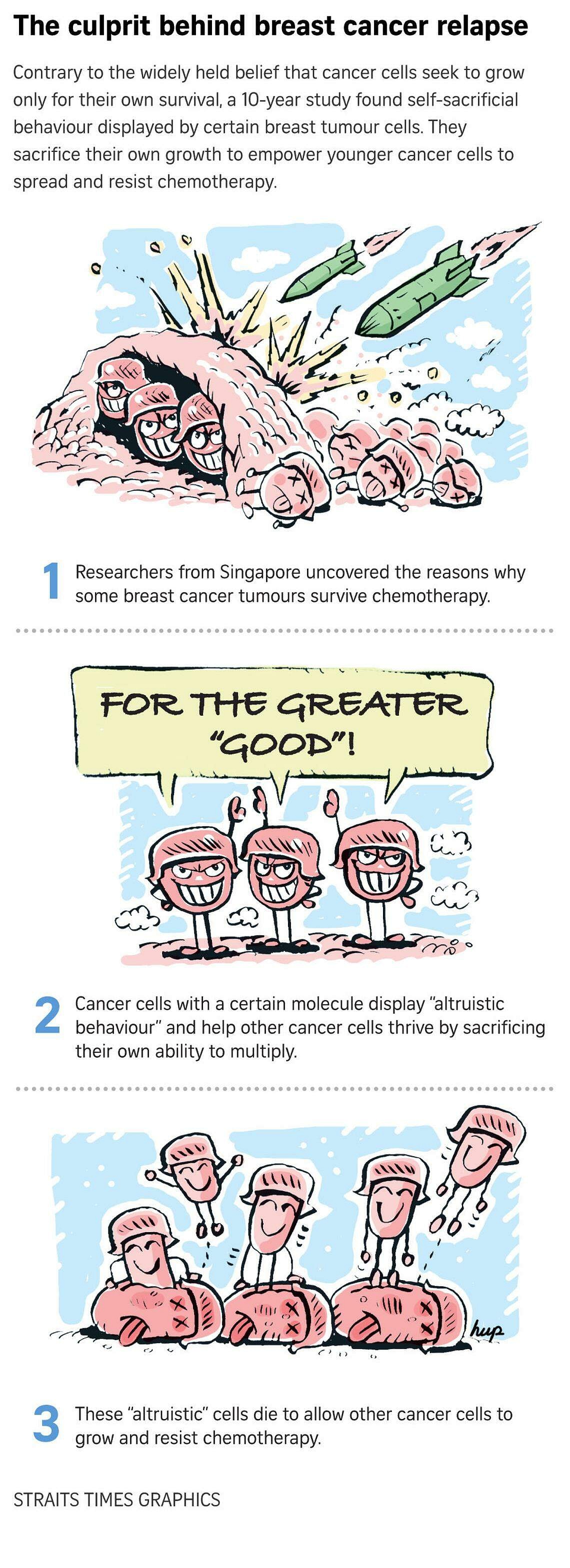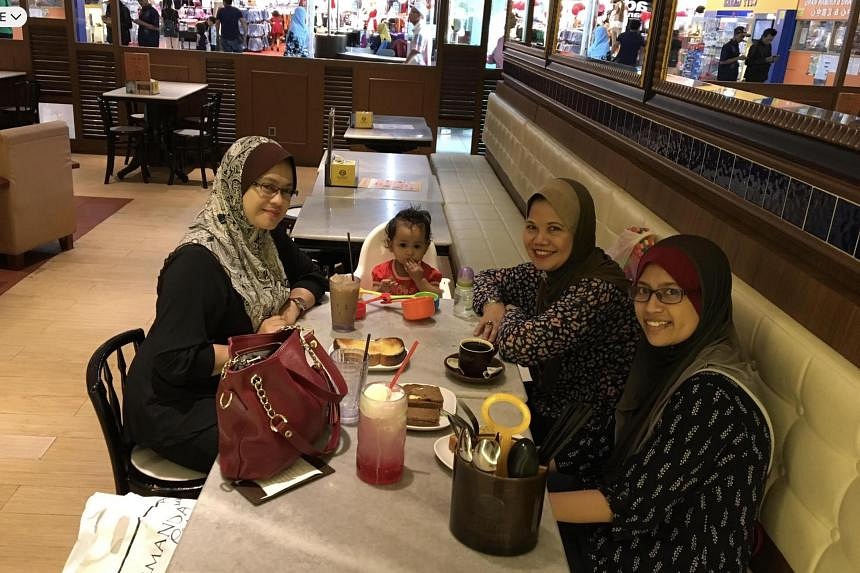SINGAPORE - A 10-year breakthrough study discovered self-sacrificial behaviour displayed by certain breast cancer cells, causing relapse of breast cancer in some patients.
Scientists from the National University of Singapore Yong Loo Lin School of Medicine (NUS Medicine) called them “altruistic”, because they sacrifice their own growth so that surrounding cancer cells can multiply and resist chemotherapy.
This unexpected discovery contradicted the widely held belief that a cancer cell seeks only its own interests for survival, and is key for more effective treatments for breast cancer.
Breast cancer is the most commonly diagnosed female cancer among Singaporean women, accounting for almost 30 per cent of all female cancers. More than 1,000 new cases are diagnosed annually and about 270 women die in Singapore each year from breast cancer.
For patients with early-stage breast cancer, there is a 7 per cent to 11 per cent chance of relapse within five years of receiving initial treatment. This rate can be higher for patients in more advanced stages of the cancer.
While chemotherapy aims to eliminate all cancer cells, some cancer cells may evade treatment and survive, resulting in recurrence of the cancer.
This was what happened to insurance agent Maznah Mohd Beon, 61.
She was diagnosed with stage 4 breast cancer in 2018 and went through six cycles of chemotherapy before she was told her tumour had shrunk and there was no need for a mastectomy.
“In 2020, I walked into a tree without realising it and, from then on, every time I went to the market, I started listing to my right, pushing people out of the way,” she said.
“My oncologist put me through MRI (magnetic resonance imaging) and that was when she found five tumours in my brain. The cancer had returned and had spread.”
Dr Leong Sai Mun from the NUS Centre for Cancer Research said what is being conventionally done by the medical community when studying cancer is looking at gene mutations, proteins and signalling within single cells.
“Our research found (breast) cancer cells interacting with each other, and they have a peculiar behaviour whereby they protect the surrounding cancer cells at the expense of their own growth, helping other cancer cells to tide over the ‘chemotherapy crisis’,” said Dr Leong, who is also from the Department of Pathology at NUS Medicine.
The team looked at not only tumour and blood samples from 63 patients with breast cancer across different stages for this study, but also laboratory-grown breast cancer cells and models.

Dr Leong said the team started 10 years ago by first analysing the blood of breast cancer patients, and it was then that they discovered a spike in a particular signal among the cancer cells from the blood.
“At that time, we were still focusing on individual cancer cells rather than the interaction. In one of these eureka moments, we mixed the cells together and found that they actually survived through chemotherapy,” he said, adding that the team was not convinced and had dismissed the discovery not once, but three times.
“Eventually, we had to come to terms with the fact that there could be interactions happening between different populations of cancer cells and, in the process, the word ‘altruism’ popped up. (It was then that) we realised that that could be happening. We performed several experiments and different models and confirmed that it is so,” Dr Leong said.
“When we mixed these populations together and treated them with chemotherapy, we expected them to overexpress themselves and survive chemotherapy,” said research fellow Muhammad Sufyan Masroni from the Department of Pathology at NUS Medicine and first author of the study.
“Instead, the total opposite happened. The population of treated cells actually became smaller, while the other cancer cells grew larger and became the majority of the cells.”
The research paper, published in peer-reviewed journal Molecular Cancer in December 2023, describes the complex signalling process within these “altruistic cells”, which results in the tumour’s overall resistance to treatment.
“Removing these altruistic cancer cells can be a potential treatment strategy. However, we may have to consider the persistence of these cells. We (also) found that the altruistic cancer cells can regenerate from the non-altruistic ones and remain within the tumour population, at a low yet consistent frequency,” said Dr Sufyan.
As for this discovery’s implications for breast cancer treatment, Dr Leong said: “By looking at the cells socially rather than (as) individual cancer cells, we will be able to devise a new, next-generation treatment that targets their social characteristics, rather than the individualistic ones.”
Associate Professor Yap Yoon Sim, a senior consultant with the Department of Breast and Gynaecological Medical Oncology at the National Cancer Centre Singapore, told The Straits Times that the study’s results provide insight into the complex mechanisms cancer cells go through to avoid being killed by chemotherapy.
“These findings merit further evaluation in various settings under exposure to different drugs, before new treatment strategies can be developed to target any vulnerabilities in the network of cancer cells,” she said.
Ms Maznah, who is now in palliative care, said cancer has been around for a long time, yet science has not found a cure for it.
“I hope that this is something that will materialise and although it may not be able to help me, I hope it will present itself as hope for women in the future,” she said.


